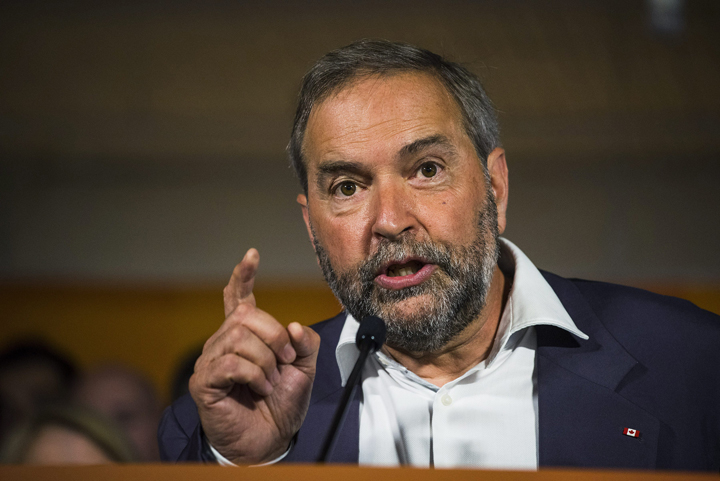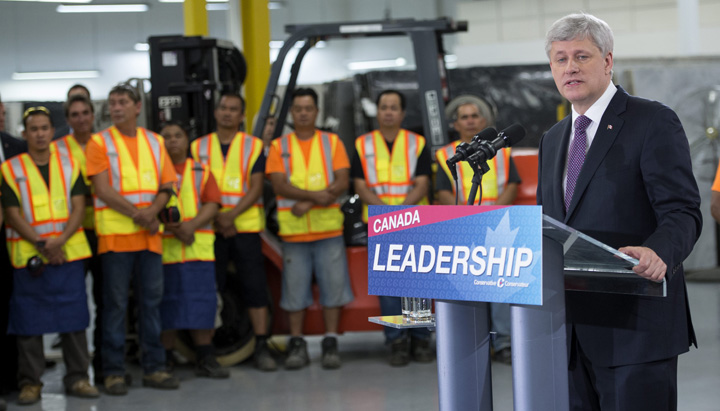Tom Mulcair took aim at Stephen Harper’s economic record during a Thursday morning speech in Toronto ahead of the first leader’s debate.

He said more people are out of work now than in 2008, Harper has the worst job creation record since the Second World War, and the worst economic growth record since the 1920s.
Is it true? Yes. But it leaves out some important context.
More people out of work now than in 2008?
That’s true. There were 1.32 million unemployed people in 2014, according to Statistics Canada data. That’s roughly 250,000 more than 2007 and about 200,000 more than 2008.
READ MORE: What you need to know as leaders trade jabs on the economy
But Canada’s population has grown by approximately 2.1 million people and the labour force by 1 million since 2008. In 2014, there were roughly 800,000 more people employed than in 2008.
At the same time, the unemployment rate did tick up to 6.8 per cent from 6.1 per cent.
Worst job creation since the Second World War?
Also true, technically.
The statistic appears in a Unifor study that compared Harper’s tenure as Prime Minister to many of Canada’s former leaders.
“Since the Harper government was elected, total employment has increased at an average annual rate of just 1.0 per cent per year,” according to the study. (The Statscan numbers bear that out: The highest year-on-year growth in the number of employed Canadians was in 2011, with 1.5 per cent.)
REALITY CHECK: Does the NDP minimum wage plan leave out 99% of minimum wage earners?
But while those numbers are accurate, they need context, says the Mowat Centre’s chief economist Mike Moffatt.
“What it doesn’t consider is demographics, for one thing – the fact that our population is slowly aging. So you’re naturally seeing more people leave the workforce as the Canadian population skews older,” Moffatt said.
“The data is completely accurate, and the claim is accurate, but the context is missing.”
Harper also had to contend with one of the worst recessions in decades and a tenuous world economy. More often than not, Canada’s unemployment rate has been above seven per cent since 1976, with particularly bad years in 1983 when it hit 12 per cent, 1984 when it hit 11.3 per cent, and 1992 and 1993 when it was 11.2 and 11.4.
The unemployment rate in 2014 was 6.9 per cent, down from a high of 8.3 per cent in 2009.
Lowest economic growth since the 1920s?
That’s true. It, too, is from the Unifor study referenced above and compares average annual GDP growth against Canada’s past prime ministers.
REALITY CHECK: How’d the NDP and Liberals vote on GST reductions?
Moffatt admits it’s true that economic growth has been slow under Harper but says “it’s a bit of a logical leap” to pin the blame on Harper’s government.
“Slow global growth, and again the changing demographics,” he said. “If you go back to the 1980s and 1990s, you had a lot more people sort of entering the labour force, and the baby boomers were in sort of their prime productive years, whereas now growth is a little bit slower again partly due to a worldwide recession, but also partly due to population aging.”
But when comparing Canada’s job creation against its contemporaries, it’s not doing too badly. Canada’s projected growth isn’t the best in the G7 as Harper so often claims but Canada’s projected 1.5 per cent year-over-year growth in 2015 is better than Japan, Italy, and France. And Canada outperformed most other G7 nations in 2013 and 2014.
Canada’s GDP growth, according to the OECD, has been among the best of the G7 since the recession.




Comments